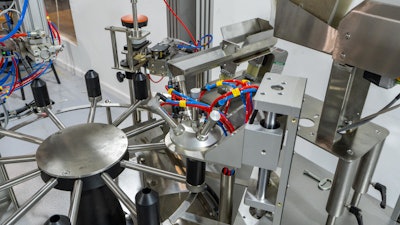
For mass producers in the cannabis industry, automation is a game-changer, promising to ease production bottlenecks and reduce labor costs.
Yet, automation is no panacea. The key to success lies in smart partnerships, efficient demand management, and strategic reinforcement.
Choosing the Right Automation Partner
The landscape of cannabis automation, especially in pre-roll manufacturing, is fraught with pitfalls.
It's crucial to select suppliers known for reliability and robust customer support, and often the best bets are companies with a longstanding presence in the industry.
For example, Hefestus has the one of the longest track records in pre-roll automation with more than 10 years. Taylor Balduff, owner of Forbidden Farms in Washington, now has the capability to produce 600,000 quality pre-rolls per month after buying a second machine from Hefestus. But that also means that Hefestus machines might not be right if you’re only doing 1,000 pre-rolls per week.
“The amount of joints we're selling today versus what we were selling before we had the machine isn’t even comparable,” Balduff said.
How to Vet Potential Automation Partners
Automation is not cheap and for good reason. If done right, it can transform your business model and market positioning.
The steep investment costs, however, give buyers a lot of power when they’re in the market for a new machine.
Ek Kirkham, COO of HPI Canna in New York, is extremely thorough when vetting a potential automation partner.
“We go inspect it, we test it, and we even try to arrange a demo on-site with our own material, if possible,” Kirkham said. “And we like to interview other people that have the equipment, so we’ll ask the vendor for a list of operators that are currently using their automation.”
Kirkham also noted that HPI Canna gravitates toward vendors that offer financing for a year or two. “That’s a big piece of the puzzle, because then we know the vendor will be a partner in the success of that equipment.”
Seeking Versatility and Support
When you invest in a new piece of automation, you’ll inevitably face a learning curve. That’s fine as long as the machine does what you need it to and doesn’t require an engineering degree.
Machines that are easy to use, maintain, and switch out between products can provide a competitive edge.
Of course, malfunctions and breakdowns will occur. This happens with any type of machinery. Parts wear out, defects occur, etc.
This is why comprehensive technical support is vital. Look for vendors that offer extensive training and can guarantee quick, effective technical assistance to minimize any disruptions.
Co-Packing for Other Brands
So, you’ve got this amazing piece of automation saving you significant costs in labor as you meet production deadlines with ease. But what if you don’t have enough demand to keep your machine running full-time through the week?
Obviously, if you can focus on your marketing strategy to increase demand for your own products, that’s fantastic.
Depending on the regulations in your market, you might also have the option to co-pack for other brands. This is what manufacturers with serious automation muscle do.
Streamline Production Processes
Is your production process super clean and proactive? Or is it a bit messy and reactive? This is a critical focus point for any cannabis manufacturer learning how to embrace automation.
Now that you have the ability to scale, you’ll need to make new choices about your production processes.
You might also find new reinforcing relationships between other activities for your business and your now supercharged manufacturing capability.
Develop Your Manufacturing Capability the Right Way
Automation in cannabis manufacturing is a potent tool for scaling operations, but its success depends significantly on choosing the right partners and maintaining flexibility in production processes.
By focusing on reliability, customer support, and operational efficiency, businesses can leverage automation to significantly enhance their manufacturing capabilities and market position.























